suhama 脱原発 脱格差社会 @suhamayuki さんのツイートだ。
――CIAは自民党をつくり、さらにヤクザを使ってコントロールする。
「山口組のみなさんのお陰で当選できました」
ジャパン・タイムズは、こうした異常現象の原因が、「自民党とヤクザ組織との長年にわたる深い関係」にあると断じているhttp://kaleido11.blog.fc2.com/blog-entry-3539.html …〔10:34 - 2015年4月11日 〕――
防衛論で
憲法9条をあざ笑う発想がどこから出てくるかと言うと、
自民党の手足である
「やくざ」の見方に囚われているから
というのは、
とても理解しやすい構図だ。
自民党は、
やくざの力を使って、
反対勢力を駆逐してきた。
しかし、実は、
その過程で逆にコントロールされることになった
ということなんだろう。
なるほど、
理解させる相手がやくざだとして
9条の平和への理念など、噴飯ものなのが納得できる。
自民党それ自体が
“極右”とされる児玉誉士夫から提供されたお金で設立された政党である
ことを考えれば、
自民党とやくざが切っても切れない関係にあることは
明らかというべきかもしれない。
上掲ツイートにリンク付けされたサイト「カレードスコープ」が
博友会をめぐる下村博文と
やくざとの黒い人間関係に触れている。
☆ 記事URL:http://kaleido11.blog.fc2.com/blog-entry-3539.html
しかし、黒い関係は、
道徳的に腐敗した下村に止まらない。
日本の首相、安倍晋三に至っては
まるで召使いのようにやくざに仕えているように見えるのは、
周知の事実だ。
記事のソースは、
2015年4月4日付のジャパンタイムズ。
記事のタイトルは
「Learning valuable lessons from the yakuza?
(ヤクザから貴重な教訓を学ぶ?)」
とのことだ。
やくざと政権との関係は、
火のないところ、煙立たず、だ。
一読に値するだろう。
下に、
資料として転載しておく。
〔資料〕
「Learning valuable lessons from the yakuza?」
Special To The Japan Times/Jake Adelstein・文
☆ 記事URL:http://www.japantimes.co.jp/news/2015/04/04/national/media-national/learning-valuable-lessons-yakuza/#.VSYeD5M2X_s
“He had connections and interactions with individuals related to the yakuza. Why on earth would he be appointed a (Cabinet) minister? The responsibility of the prime minister for appointing him to this position is tremendously weighty.”
These angry words were said by a New Komeito Diet member in 2012. The Cabinet minister in question was Keishu Tanaka, a Democratic Party of Japan member appointed as the minister of justice.
In contrast, Komeito and the Liberal Democratic Party have remained remarkably silent about the yakuza allegations surrounding Education Minister Hakubun Shimomura.
Shimomura lobbied hard for his position in 2012 when Prime Minister Shinzo Abe’s LDP and Komeito coalition government seized power. He also spearheaded Abe’s program to bring back “moral education” in schools. If you have any ethical sensibilities he appears to be the quintessential hanmen kyōshi — “someone who teaches by setting a poor example.” Even without an education in morality, most people know that it’s wrong to take money from the yakuza or accept campaign contributions that may be possibly illegal.
The scandal began in January, when the Akahata Shimbun reported that a front company for the country’s largest crime group, the Yamaguchi-gumi, had donated \180,000 over two years to a branch of the LDP — the Tokyo No. 11 district — headed by Shimomura. The company is banned from accepting public works and recognized by the police in Osaka as a yakuza operation, specifically a Yamaguchi-gumi Kodo-kai operation. (Remember that name — it comes up again.)
The scandal didn’t attract a great deal of attention and interest in it waned after a short time. In February, however, the Shukan Bunshun reported that Shimomura had received illegal political funds, including contributions from another individual connected to — surprise, surprise — the Yamaguchi-gumi Kodo-kai. He quickly denied the allegations.
The Shukan Bunshun and Sankei Shimbun have reported that regional support groups acting on Shimomura’s behalf had not been registered as political organizations and had improperly and, possibly, illegally collected funds on his behalf. These support groups, operating under regional organizations called hakuyūkai, were consortiums of private school and cram school owners. One might suspect a conflict of interest in them funding the man in charge of public education, but let’s put that issue aside for a second.
The Political Funds Control Law obliges entities that support a politician or nominate a political candidate to register as a political group and submit reports on their income and expenditure of political funding. The groups run by Shimomura’s regional hakuyūkai failed to do this.
When he appeared before the Lower House Budget Committee on Feb. 26, Shimomura said he had never received a donation from the regional groups, nor had he ever received money for “taxi fares” or “travel expenses.” He also described the political groups as voluntary organizations set up by friends in the education industry.
At first, Shimomura said he planned to protest over the magazine’s report. He also denied receiving a \100,000 donation in 2009 from Masahiro Toyokawa, a yakuza associate and former cram school operator.
Police sources say Toyokawa is a longtime associate member of the Yamaguchi-gumi — specifically, the Kodo-kai — and that Toyokawa and Shimomura had known each other for several years. They believe that Toyokawa may still be running cram schools from behind the scenes.
Toyokawa also reportedly loaned roughly $6 million to a chain of massage parlors known to be paying protection money to the Yamaguchi-gumi, according to several reports. Toyokawa is important because he was also a central figure in creating the Chubu Hakuyūkai, one of the main political groups collecting funds for Shimomura.
Shimomura has changed his story several times and even admitted that his secretary had urged regional support groups not to speak to reporters about allegations of financial irregularities. He has also admitted to receiving the \100,000 donation from Toyokawa, reversing previous denials.
A former executive member of a hakuyūkai support group held a news conference last month, during which she admitted giving Shimomura an additional \100,000 in cash for a lecture, saying the money had come from Toyokawa. Shimomura has denied this.
Although the jury is still out on how the country’s “moral education” is working out, it’s hard to imagine that voters condone taking money from criminals or lying while in public office. Since Oct. 1, 2011, it is also illegal to accept money of any kind from “anti-social forces” — including members of the yakuza and its associates.
In the same way the government’s new education policy places importance on tradition, domestic politics has long had ties to gangsters. The LDP itself was founded with money provided by notorious underworld power broker Yoshio Kodama.
Even Abe’s grandfather, former Prime Minister Nobusuke Kishi, respected the yakuza, particularly the Yamaguchi-gumi. In 1971, Kishi paid the bail of a Yamaguchi-gumi leader who was later convicted of murder.
Abe himself has been photographed in 2008 with Yamaguchi-gumi associate Icchu Nagamoto, but has denied any knowledge of the man.
On the other hand, Nagamoto told his yakuza connections that he helped gather local votes for Abe to be elected top dog of the LDP in 2006, thereby ensuring Abe became prime minister in his first time at bat. That said, it’s hard to take a gangster’s words at face value.
The law says that accepting money from anti-social forces, asking them to set up your political support group and supporting yakuza-backed groups is illegal.
National Police Agency chief Eriko Yamatani also has a history of association with Zaitokukai, a yakuza-linked group that has been identified as being a security threat and is responsible for hate crimes. How much could and should be read into this?
Abe has not apologized for the questionable connections of his handpicked Cabinet members. In fact, he has said nothing — I can’t find a record of him condemning the yakuza or those who kowtow to them. The Japanese word for this is mokunin, or admission by silence.
Silence, sometimes, speaks louder than words.
――CIAは自民党をつくり、さらにヤクザを使ってコントロールする。
「山口組のみなさんのお陰で当選できました」
ジャパン・タイムズは、こうした異常現象の原因が、「自民党とヤクザ組織との長年にわたる深い関係」にあると断じているhttp://kaleido11.blog.fc2.com/blog-entry-3539.html …〔10:34 - 2015年4月11日 〕――
防衛論で
憲法9条をあざ笑う発想がどこから出てくるかと言うと、
自民党の手足である
「やくざ」の見方に囚われているから
というのは、
とても理解しやすい構図だ。
自民党は、
やくざの力を使って、
反対勢力を駆逐してきた。
しかし、実は、
その過程で逆にコントロールされることになった
ということなんだろう。
なるほど、
理解させる相手がやくざだとして
9条の平和への理念など、噴飯ものなのが納得できる。
自民党それ自体が
“極右”とされる児玉誉士夫から提供されたお金で設立された政党である
ことを考えれば、
自民党とやくざが切っても切れない関係にあることは
明らかというべきかもしれない。
上掲ツイートにリンク付けされたサイト「カレードスコープ」が
博友会をめぐる下村博文と
やくざとの黒い人間関係に触れている。
☆ 記事URL:http://kaleido11.blog.fc2.com/blog-entry-3539.html
しかし、黒い関係は、
道徳的に腐敗した下村に止まらない。
日本の首相、安倍晋三に至っては
まるで召使いのようにやくざに仕えているように見えるのは、
周知の事実だ。
記事のソースは、
2015年4月4日付のジャパンタイムズ。
記事のタイトルは
「Learning valuable lessons from the yakuza?
(ヤクザから貴重な教訓を学ぶ?)」
とのことだ。
やくざと政権との関係は、
火のないところ、煙立たず、だ。
一読に値するだろう。
下に、
資料として転載しておく。
〔資料〕
「Learning valuable lessons from the yakuza?」
Special To The Japan Times/Jake Adelstein・文
☆ 記事URL:http://www.japantimes.co.jp/news/2015/04/04/national/media-national/learning-valuable-lessons-yakuza/#.VSYeD5M2X_s
“He had connections and interactions with individuals related to the yakuza. Why on earth would he be appointed a (Cabinet) minister? The responsibility of the prime minister for appointing him to this position is tremendously weighty.”
These angry words were said by a New Komeito Diet member in 2012. The Cabinet minister in question was Keishu Tanaka, a Democratic Party of Japan member appointed as the minister of justice.
In contrast, Komeito and the Liberal Democratic Party have remained remarkably silent about the yakuza allegations surrounding Education Minister Hakubun Shimomura.
Shimomura lobbied hard for his position in 2012 when Prime Minister Shinzo Abe’s LDP and Komeito coalition government seized power. He also spearheaded Abe’s program to bring back “moral education” in schools. If you have any ethical sensibilities he appears to be the quintessential hanmen kyōshi — “someone who teaches by setting a poor example.” Even without an education in morality, most people know that it’s wrong to take money from the yakuza or accept campaign contributions that may be possibly illegal.
The scandal began in January, when the Akahata Shimbun reported that a front company for the country’s largest crime group, the Yamaguchi-gumi, had donated \180,000 over two years to a branch of the LDP — the Tokyo No. 11 district — headed by Shimomura. The company is banned from accepting public works and recognized by the police in Osaka as a yakuza operation, specifically a Yamaguchi-gumi Kodo-kai operation. (Remember that name — it comes up again.)
The scandal didn’t attract a great deal of attention and interest in it waned after a short time. In February, however, the Shukan Bunshun reported that Shimomura had received illegal political funds, including contributions from another individual connected to — surprise, surprise — the Yamaguchi-gumi Kodo-kai. He quickly denied the allegations.
The Shukan Bunshun and Sankei Shimbun have reported that regional support groups acting on Shimomura’s behalf had not been registered as political organizations and had improperly and, possibly, illegally collected funds on his behalf. These support groups, operating under regional organizations called hakuyūkai, were consortiums of private school and cram school owners. One might suspect a conflict of interest in them funding the man in charge of public education, but let’s put that issue aside for a second.
The Political Funds Control Law obliges entities that support a politician or nominate a political candidate to register as a political group and submit reports on their income and expenditure of political funding. The groups run by Shimomura’s regional hakuyūkai failed to do this.
When he appeared before the Lower House Budget Committee on Feb. 26, Shimomura said he had never received a donation from the regional groups, nor had he ever received money for “taxi fares” or “travel expenses.” He also described the political groups as voluntary organizations set up by friends in the education industry.
At first, Shimomura said he planned to protest over the magazine’s report. He also denied receiving a \100,000 donation in 2009 from Masahiro Toyokawa, a yakuza associate and former cram school operator.
Police sources say Toyokawa is a longtime associate member of the Yamaguchi-gumi — specifically, the Kodo-kai — and that Toyokawa and Shimomura had known each other for several years. They believe that Toyokawa may still be running cram schools from behind the scenes.
Toyokawa also reportedly loaned roughly $6 million to a chain of massage parlors known to be paying protection money to the Yamaguchi-gumi, according to several reports. Toyokawa is important because he was also a central figure in creating the Chubu Hakuyūkai, one of the main political groups collecting funds for Shimomura.
Shimomura has changed his story several times and even admitted that his secretary had urged regional support groups not to speak to reporters about allegations of financial irregularities. He has also admitted to receiving the \100,000 donation from Toyokawa, reversing previous denials.
A former executive member of a hakuyūkai support group held a news conference last month, during which she admitted giving Shimomura an additional \100,000 in cash for a lecture, saying the money had come from Toyokawa. Shimomura has denied this.
Although the jury is still out on how the country’s “moral education” is working out, it’s hard to imagine that voters condone taking money from criminals or lying while in public office. Since Oct. 1, 2011, it is also illegal to accept money of any kind from “anti-social forces” — including members of the yakuza and its associates.
In the same way the government’s new education policy places importance on tradition, domestic politics has long had ties to gangsters. The LDP itself was founded with money provided by notorious underworld power broker Yoshio Kodama.
Even Abe’s grandfather, former Prime Minister Nobusuke Kishi, respected the yakuza, particularly the Yamaguchi-gumi. In 1971, Kishi paid the bail of a Yamaguchi-gumi leader who was later convicted of murder.
Abe himself has been photographed in 2008 with Yamaguchi-gumi associate Icchu Nagamoto, but has denied any knowledge of the man.
On the other hand, Nagamoto told his yakuza connections that he helped gather local votes for Abe to be elected top dog of the LDP in 2006, thereby ensuring Abe became prime minister in his first time at bat. That said, it’s hard to take a gangster’s words at face value.
The law says that accepting money from anti-social forces, asking them to set up your political support group and supporting yakuza-backed groups is illegal.
National Police Agency chief Eriko Yamatani also has a history of association with Zaitokukai, a yakuza-linked group that has been identified as being a security threat and is responsible for hate crimes. How much could and should be read into this?
Abe has not apologized for the questionable connections of his handpicked Cabinet members. In fact, he has said nothing — I can’t find a record of him condemning the yakuza or those who kowtow to them. The Japanese word for this is mokunin, or admission by silence.
Silence, sometimes, speaks louder than words.










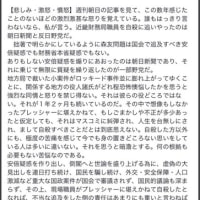
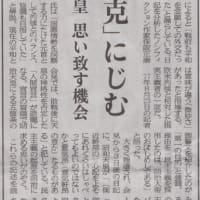
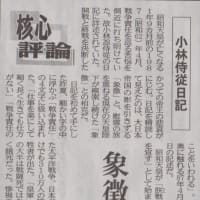
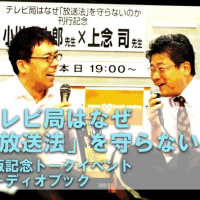
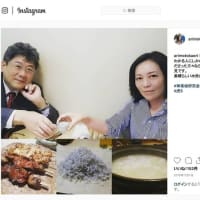
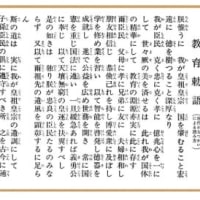

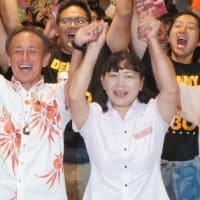

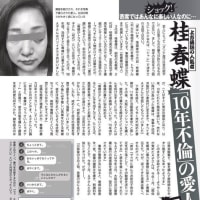
※コメント投稿者のブログIDはブログ作成者のみに通知されます